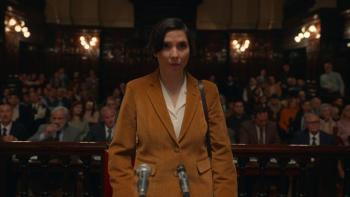The Academy is a large enough and complex enough group that it’s hard to ascribe a single motivation to it the way you can, and I frequently do, to the people choosing new selections for the National Film Registry. However, once the individual countries have submitted their official entries to the Academy in Best Foreign Language Film, or whatever you choose to call the category, the actual nominees are selected by a committee. The Academy won’t say how many people are in the committee that establishes the short list or the committee that determines the nominees. However, it seems likely that it’s a small enough group so that this aspect of the Academy, if nothing else, can have goals and an agenda. And this year, it seems probable that the committee wants us to understand that we have a responsibility to history.
The frontrunner is the depressing slog that is All Quiet on the Western Front. (It’s good, but it’s also a depressing slog. It can be two things.) It’s the story of the futility of war giving as an example one of the most futile wars in history. The one thing the film does that the book, and previous adaptations, do not, is show the fact that the futility ran all the way to the top. World War I was a waste, and not only is it a waste that echoes to this day, it’s a waste that we’ve never really come to terms with. If we had taken responsibility instead of assigning blame a century ago, so much of what has gone wrong since then would not have happened.
Meanwhile, the in my opinion considerably better Argentina, 1985 is about how we take responsibility. What does that look like? We are given the voices of those harmed by the military dictatorship of Argentina. Those who were themselves assaulted, tortured, and so forth. Those whose loved ones were murdered or “disappeared.” And those who were in charge in those days are still broadly in charge during the days of the trial. Many officers in the military believed that, if the generals and admirals were held responsible for their actions, that might mean they’d be held responsible for their actions as well.
I’m not all the way caught up on the race. But even just reading plot summaries of the other three makes it clear that the committee is asking questions about how we see the world and what we owe others for our actions. It suggests that we cannot move forward without acknowledging and atoning for the sins of our past—and that we must move forward, and that not doing so is damaging to our future. It’s possible that other, better films may have been swept aside in the drive to make this specific point, but let’s be fair; the way the nominees are chosen pretty well guarantees that some of the best movies from countries outside the US are not even considered. It’s still better work than the rest of the Academy is doing.
If the secretive cabal responsible for the nominees in Best Foreign Language Film are the most socially progressive branch of the Academy, well, that’s surprising but something I guess we’ll live with. It doesn’t tell us who’s going to win on Sunday, as voting is open to any Academy member who screens the movies in the theatre. Even my kids know that the Academy can make some weird choices, and they haven’t been paying attention for anywhere near as long as I have. Then again, they haven’t seen any of the nominees. We’ll see if the trend continues as they age and if the committee continues to have the capacity for snark of the Library of Congress.
Help me afford to rent the last couple of nominees I’ll have to pay for by supporting my Patreon or Ko-fi!

